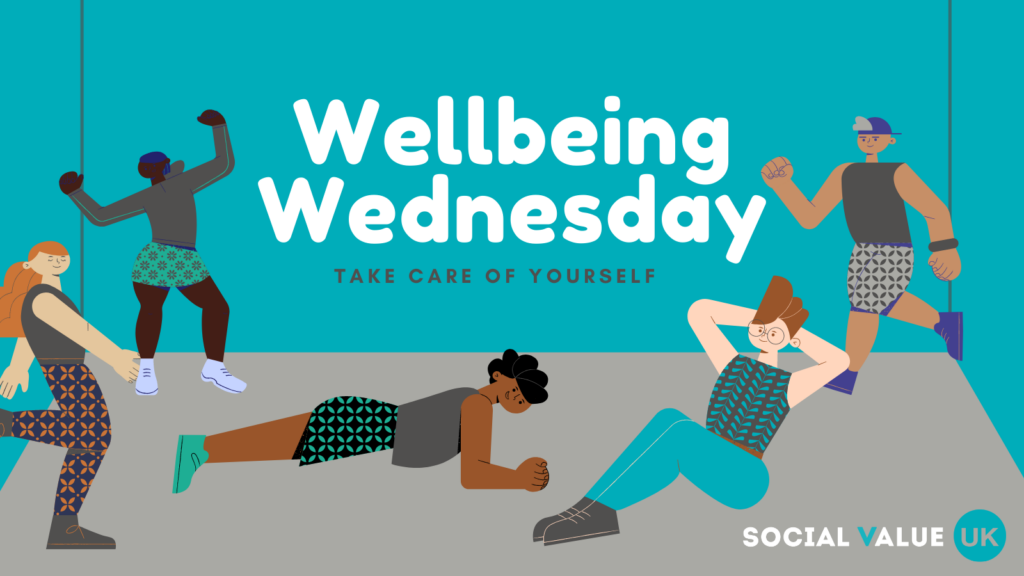
Posted 27th April 2021
The following blog was written by Social Value UK’s Digital Marketing, Communications and Events Assistant, Maddy England. Social Value UK continues to show a commitment to accounting for social value, thus working to decrease inequality and improve wellbeing
Not exclusive to the COVID-19 pandemic, but evident a thousand times over during these times; taking care of your mental health and wellbeing is crucial.
More recently we are seeing a societal shift from the outdated practice of leaving our mental wellbeing outside office doors – with workplaces encouraging employees to talk about these issues and take time out when needed. However, evidently there is more to be done as in 2020 76% of people believed their employers should be doing more to protect their mental health.
It goes without saying, there is a lot of overlap between mental wellbeing, physical health and work performance and satisfaction. Obviously, if an individual is struggling mentally this can have a knock on impact on their general health and also working ability.
Although integral, it is often pushed to the bottom of the to do list as it is seemingly not a tangible immediate issue, the way a physical issue might be. However, by creating small concrete tasks, the idea of working on our wellbeing becomes much more manageable. The following are some suggestions for both individuals in their personal life and for employers when running a workplace – hopefully you can take away some ideas to work on!
As an individual
At the most basic level, the NHS official guidance shows the following to be excellent at rebuilding mental wellness:
- Connecting with others: days out with friends & family zoom quizzes or having lunch with a colleague
- Physical activity: find free activities in your area such as couch to 5K, Youtube workouts or increasing your daily step count.
- Developing new interests: be it cooking, DIY or languages, it is a great confidence booster.
- Small acts of kindness: keeping up with friends struggles or volunteering in your community.
- Existing in the present: paying attention to the present moment helps you to appreciate the small things and think more positively about life
Of course, often it can feel daunting to speak to ‘real life’ people about your mental health for fear of judgement. If you’re, like many others, feeling this way there are plenty of useful technology developments that are great for providing that extra support – judgement free!
To name but a few; Headspace is excellent for mindfulness and guided meditation activities, WorryTree encourages recording and managing worries and stress and Streaks which encourages logging positive habits such as exercise, sobriety and meditation.
Specifically to the current pandemic, working from home can often cause a dip in mental wellbeing. The loss of routine and typical day to day life can lead to a loss in motivation. A great and probably obvious way to stay on top of this is to follow your normal sleep and work patterns if you can, and stay consistent! By getting up and dressed for the day (as you usually would for a work day) and moving to a designated work space, it should feel easier to separate work time and personal life.
As an employer
It is integral that organisations place more importance on the mental wellbeing of their employees. Oracle suggests HR team advancement such as learning how to connect employees to the right resources, developing working community relationships and being genuinely interested in individual’s career growth.
Another significant change to make is signing and following the Time to Change Employer Pledge, making a public commitment to tackle mental health stigma and discrimination. This will send a powerful message to employees that it’s OK to talk about mental health and also encourage other organisations to get involved as well.
In guidance by Mind, it is suggested that employers should tackle work place mental health such as long working hours, minimal breaks, unmanageable workloads and lone working, by encouraging staff to do the following:
- Take full lunch breaks
- Rest and recuperate after busy periods
- Avoid working outside of scheduled time
- Take their full annual leave entitlement
In general, flexible working, in terms of working time, location or the pattern of working, can support healthier and more productive ways of working for all staff. For example, it can help an employee to manage stress by allowing occasional later start times to accommodate for wellness activities/exercise.
All of these changes can help to alleviate some workplace worries and show solidarity and support for team members. In turn this can only help improve the success of your team!
Look at after yourself (and your team!) – The Social Value UK Team
